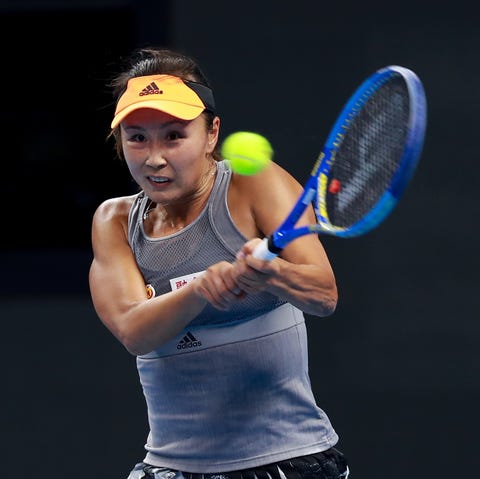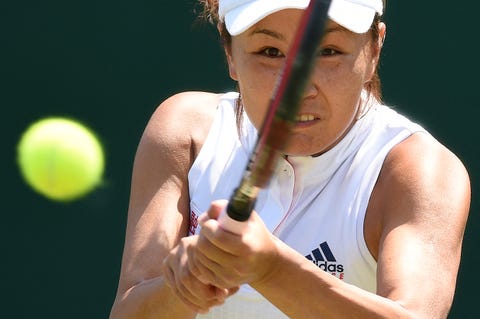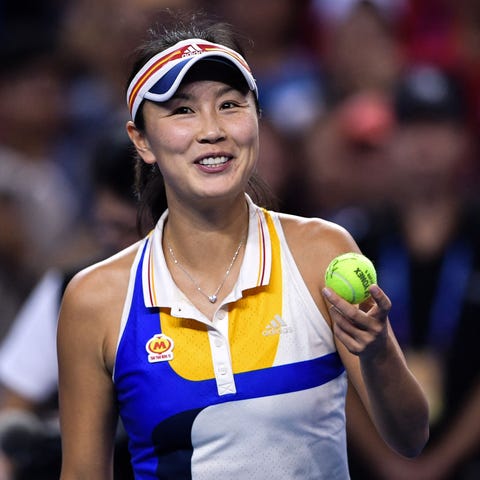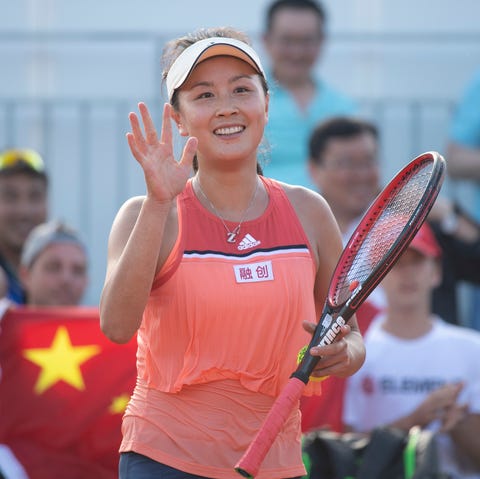Peng Shuai was at the top of her game. The 35-year-old Chinese tennis star and former world doubles champion garnered international acclaim for winning major titles at both Wimbledon and the French Open—helping put Chinese tennis on the map.
Then, one day in November, she disappeared from public view. After revealing on Weibo that she was sexually assaulted by a top Chinese official, Peng’s social media accounts got shut down and her name became unsearchable on Chinese search engines. The Women’s Tennis Association, along with a number of the world’s top tennis players (including Naomi Osaka and Serena Williams), voiced concern for Peng’s whereabouts. It didn’t take long for the hashtag #WhereIsPengShuai to trend on Twitter and Instagram.
After several months, Peng has suddenly resurfaced. According to multiple news outlets, she took back her claims of sexual assault in an interview published by a Singaporean newspaper. However, the retraction has done little to settle concerns about Peng, who many believe was and still is the target of a propaganda campaign carried out by the Chinese government. Here’s everything you need to know about the events leading up to Peng’s mysterious disappearance—and where she is now.
On November 2, Shuai accused a former vice premier of sexual assault.
In a reported 1,600-word post on Weibo, Shuai wrote that a retired vice premier pressured her into having sex with him. “Why did you have to come back to me, took me to your home to force me to have sex with you? Yes, I did not have any evidence, and it was simply impossible to have evidence,” she wrote, according to CNN. “I couldn’t describe how disgusted I was, and how many times I asked myself am I still a human? I feel like a walking corpse. Every day I was acting, which person is the real me?” She also reportedly wrote: “That first afternoon, I didn’t agree to it and I cried the whole time.”
In the Weibo post, she also recounted having an on-again, off-again consensual affair with the man before he became vice premier. “You’ve said that you’re not afraid,” Peng wrote, according to the New York Times, “but even if it’s just me, like an egg hitting a rock, or a moth to the flame, courting self-destruction, I’ll tell the truth about you.”
Peng vanished after posting to Weibo.
Peng’s allegations disappeared from Weibo in less than 30 minutes, and her name was blocked from online searches. Even searches for “tennis” were temporarily blocked—but not before Peng’s accusations went viral, gaining media coverage all over the world. According to a New York Times feature published with ProPublica:
China began a multifaceted propaganda campaign that was at once sophisticated and clumsy. Inside the country, officials used internet controls to scrub almost all references to the accusation and restrict digital spaces where people might discuss it. At the same time, they activated a widely followed network of state-media commentators, backed by a chorus of fake Twitter accounts, to try to punch back at critics abroad, the analyses show.
Meanwhile, Peng hadn’t been heard from since posting her story.
Politicians and athletes are among those who voiced their support for Peng.
A number of big tennis stars, including Naomi Osaka and Serena Williams, expressed their concerns for Peng—and challenged China to get answers.
This content is imported from Twitter. You may be able to find the same content in another format, or you may be able to find more information, at their web site.
This content is imported from Twitter. You may be able to find the same content in another format, or you may be able to find more information, at their web site.
So did the Professional Tennis Players Association.
This content is imported from Twitter. You may be able to find the same content in another format, or you may be able to find more information, at their web site.
The Women’s Tennis Association chose to suspend all tournaments in China amid their ongoing concerns over the safety of Peng. Steve Simon, head of the WTA, told CNN: “This is bigger than the business, women need to be respected and not censored.”
This content is imported from Twitter. You may be able to find the same content in another format, or you may be able to find more information, at their web site.
Ahead 0f the 2022 Winter Olympics in Beijing, Biden and the United Nations both demanded proof of Peng’s whereabouts. White House press secretary Jen Psaki said in a press conference that the administration asked China to provide “independent, verifiable proof” of her safety.
This content is imported from Twitter. You may be able to find the same content in another format, or you may be able to find more information, at their web site.
The IOC has said that Peng is ”fine.”
The International Olympic Committee (IOC) claimed to have had two video calls with Peng since she posted to Weibo in November. According to CNN, after the first call, IOC chairman Dick Pound said Peng appeared “fine.” During a second call a few weeks later, the IOC again claimed Peng appeared to be “safe and well.” The IOC will also meet with her in person in January.
“We are using ‘quiet diplomacy’ which, given the circumstances and based on the experience of governments and other organizations, is indicated to be the most promising way to proceed effectively in such humanitarian matters,” the IOC said in a statement.
Meanwhile, Peter Dahlin of the human-rights NGO Safeguard Defenders has written an open letter to the IOC calling the video calls with Peng, “eerily similar to a recurrent CCP tactic of stage-managed TV appearances, where victims are paraded and forced to perform by the police, often in an effort to counter international criticism.”
The Chinese government also says Peng is fine—but experts warn about a heavily scripted narrative.
On November 17, the state broadcaster China Global Television Network (CGTN) tweeted out a purported statement from Peng in English assuring the world that she is “not missing, nor am I unsafe. I’ve just been resting at home and everything is fine. Thank you again for caring about me.” In the message, Peng also recants the allegations of sexual assault she made.
Steve Simon, head of the WTA, called for independent verification of Shuai’s whereabouts and safety. “I have a hard time believing that Peng Shuai actually wrote the email we received or believes what is being attributed to her. Peng Shuai displayed incredible courage in describing an allegation of sexual assault against a former top official in the Chinese government. The WTA and the rest of the world need independent and verifiable proof that she is safe. I have repeatedly tried to reach her via numerous forms of communication, to no avail,” Simon said. “Peng Shuai must be allowed to speak freely, without coercion or intimidation from any source. Her allegation of sexual assault must be respected, investigated with full transparency and without censorship.”
Since then, a handful of strange photos and videos of Peng have surfaced. Two days after she purportedly gave the statement to CGTN, photos of Peng playing with a gray cat were posted to Twitter. CGTN has also posted videos of Peng apparently eating with her coach (though Peng doesn’t speak).
In an interview with the New York Times, Pin Ho, a businessman in New York who owns Mirror Media Group, a Chinese-language news outlet, said the state “buried their heads in the sand and made these theatrical scenes, one after another.” He added, “if someone says they’re free, while they’re in the hands of a kidnapper, that is terrifying.”
In a strange new interview, Peng recanted her allegations of sexual-assault.
On December 19, the Lianhe Zaobao Chinese-language Singaporean newspaper posted a video of Peng reportedly taken Sunday on the sidelines of a skiing event in Shanghai. A journalist asks about the sexual assault allegations, to which Peng says: “I want to emphasize something that is very important. I have never said that I wrote that anyone sexually assaulted me. I need to emphasize this point very clearly.”
Shaui’s strange reversal has only sparked further suspicions: Is this another attempt by Chinese officials to assuage global concern for her well-being? In response to the interview, the WTA released a statement to ESPN saying the organization remains concerned about Peng’s “ability to communicate without censorship or coercion.”
“As we have consistently stated, these appearances do not alleviate or address the WTA’s significant concerns about her well-being and ability to communicate without censorship or coercion,” the WTA said in the statement to ESPN. “We remain steadfast in our call for a full, fair and transparent investigation, without censorship, into her allegation of sexual assault, which is the issue that gave rise to our initial concern.”
This story will be updated when more information is available.
This content is created and maintained by a third party, and imported onto this page to help users provide their email addresses. You may be able to find more information about this and similar content at piano.io




